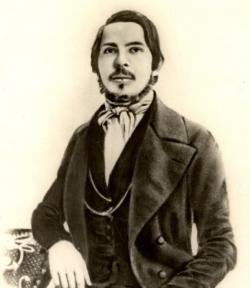Short Pamphlet by Engels
By Mark Langabeer, Newton Abbot Labour member
This short pamphlet, written by Friedrich Engels and published in 1847, contained many of the ideas of the Communist Manifesto that was co-written with Marx a year later. It outlined the programme and objects of the Communist movement.
Although Engels credited Marx as the founder of Communism, especially with regards to the discovery of the inner laws of the capitalist economy, in my view, Engels’ writings are more accessible, in particular, for those who are first time readers of the works of the great founders of scientific socialism.
My initial reaction to this wonderful pamphlet was that it was so short: only 25 pages and easily read in an hour. Thank God for that! Engels’ great strength was his ability to explain socialist ideas in a simple fashion. The pamphlet was written in a Question and Answer format and it outlines a programme that was similar, although not identical, to the programme in the Communist Manifesto.
The liberation of the working class
The very first question is ‘What is Communism?’ Engels’ reply is that it is the doctrine of the conditions of the liberation of the working class. He explains terms such as ‘proletariat’ and ‘bourgeoisie’ – in modern terms, the working class and the owners of large workplaces – and how these classes evolved. He also gives the reader an insight into the nature of the exploitation of workers by the factory owners. He offers a twelve-point political programme to end the unequal relationship between workers and the bosses.
Although there are some aspects that no longer apply, astonishingly, much of the programme written by Engels remains applicable to this very day, a hundred and seventy years later. He notes that communists would confiscate all possessions of emigrés, owners of properties who exploit their ownership but live in luxury abroad to avoid taxes as well as other things. This was at a time when travelling abroad was the preserve of the aristocracy and the wealthiest within society. We still have the same emigré tax-dodgers today, like Richard Branson and Philip Green.
The ‘English Riviera’
As an aside, I recall a fellow bus driver in Torquay explaining the reason why that area is called the ‘English Riviera’. During the French Revolution, he explained, the British nobility stopped visiting the French Riviera for holidays and convalescence for fear of meeting the same fate as their aristocratic pals in France, so they decided to adopt Torbay as an alternative, hence the name of English Riviera .
Although the programme of Engels was similar to and probably a template for the Communist Manifesto, it actually has more relevance in today’s world than elements of the Manifesto. The Manifesto called for the abolition of all inheritance, whereas Engels suggested heavy taxation and preventing inheritance to more distant relatives. Today, many workers are owner-occupiers and consider it reasonable to pass on their hard-earned property to their children. But in Engels time, most workers had little more than the clothes they stood up in. Progressive inheritance taxes would in my view, be a more appropriate demand. All the other demands that would transform society remain as relevant today as they were when they were written by Engels in 1847.
Russian revolution of 1917
The only thing that has proven false in the pamphlet was the perspective that Communism would triumph first in the most industrially advanced nations. In fact, it was Russia that became the first Communist state, because of the special combination of ‘advanced’ and ‘backward’ conditions that prevailed there in 1917. Lenin referred to this as the chain of international capitalism breaking at its weakest link.
Nowadays, of course, ‘badges’ and ‘labels’ often mean something different to what they originally meant. I would not refer to myself as a communist today because of the awful legacy of Stalin that sullied the name of communism for several generations. However, I would regard myself a supporter of Left-Horizons which advocates support for Marxist ideas.
Better to have a clear understanding
By and large, the ideas of Engels have stood the test of time and should be read by all thinking workers and anyone who wants to understand the roots and traditions of socialism. It is not enough to be an activist in the Labour Party or in a trade union. It is far better to have a clear understanding of where our movement came from and its place in society.
Engels pamphlet on Communism has the added advantage that it is relatively short and it dispenses with much of the jargon that often appears in Marxist literature. There are, of course, some who dismiss Marxism. We know the right wing of the Labour Party, in their ignorance, believe it has no place in the party, although it has a long and rich history of support in the party. The press regularly scream about Corbyn being a Marxist, although actually he his not. What the accusations against Corbyn do show is that the ideas expressed by Marx and Engels still strike fear in the heart of the establishment. As they did in 1847, those who own the means of production, distribution and exchange tremble for their future.
November 28, 2020



